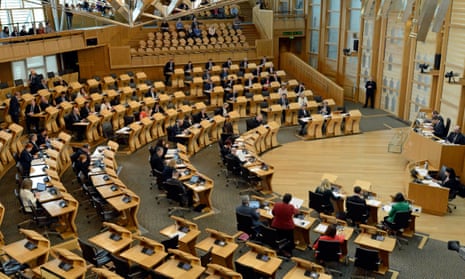Scotland has taken control of its welfare system in a transfer of power from Westminster that campaigners have praised for recognising social security as a human right.
The first devolved welfare system also offers automatic split payments of universal credit to protect women’s financial autonomy and aims to end unnecessary disability assessments.
As the Holyrood parliament unanimously passed the final stage of the social security (Scotland) bill on Wednesday evening, the director of the Poverty Alliance, Peter Kelly, said it offered the possibility of the new welfare system playing a very different role in Scotland.
“With almost daily reports of the impact of the cuts to social security at the UK level, such as the freeze on levels of many UK benefits or the roll out of universal credit, it is time to show that a different approach is possible.”
The new powers, part of the package promised to the Scottish parliament after the 2014 independence referendum, account for 15% of Scotland’s total benefits bill and will affect 1.4 million people.
Eleven benefits are being wholly transferred, including disability living allowance and personal independence payments, along with the opportunity to top up existing payments and create new ones.
The bill was passed after an intense afternoon of debate, which showcased the cross-party and third sector expertise that has shaped the landmark bill, alongside the input of ordinary Scots canvassed in a country-wide consultation.
There were a number of significant last-minute amendments to the legislation, including the removal of any time limit on terminal illness. It was brought by the social security minister, Jeane Freeman, after senior medical professionals called for its inclusion. Current rules for disability benefits and universal credit say a patient must have six months or less to live before their illness is classed as terminal.
The feminist campaign group Engender welcomed the success of Labour MSP Mark Griffin’s amendment on split payments, in particular for those 89% of domestically abused women who experience financial restrictions by their partner.
Both the Poverty Alliance and the Child Poverty Action Group Scotland called on Freeman to reconsider Griffin’s unsuccessful amendment to top up child benefit by £5 a week, which he insisted would lift 30,000 children out of poverty. The Scottish government argued that the framework bill for the new powers was not the appropriate place for such a change.
Presenting the final bill to Holyrood, Freeman said: “The devolution of social security represents the greatest single increase in the responsibilities of this parliament since devolution. Today we write a new chapter in our history, a system built for the people of Scotland, designed in partnership with the people of Scotland, a system with dignity, fairness and respect at its heart, a system quite unlike any other that has gone before.”
The new system will include an unprecedented degree of independent scrutiny, put in place after anti-poverty groups expressed concerns about the extent to which the detail of new benefits is being left to regulations, rather than included within primary legislation, which could make it easier for subsequent governments to cut payments or change eligibility criteria.
